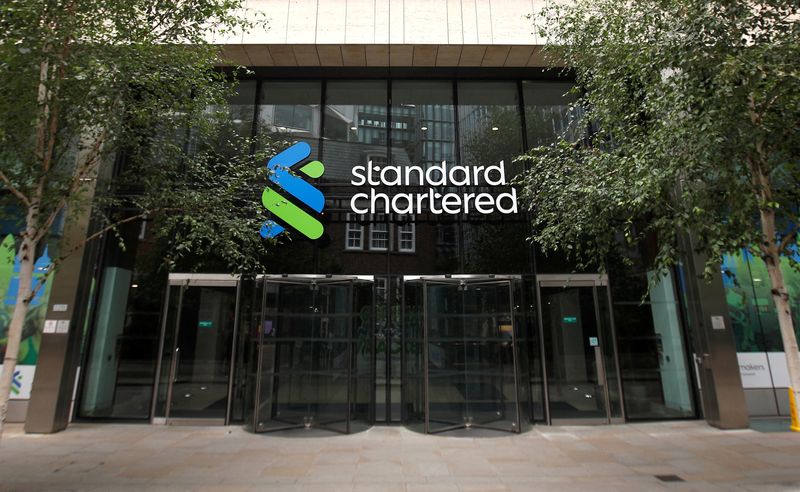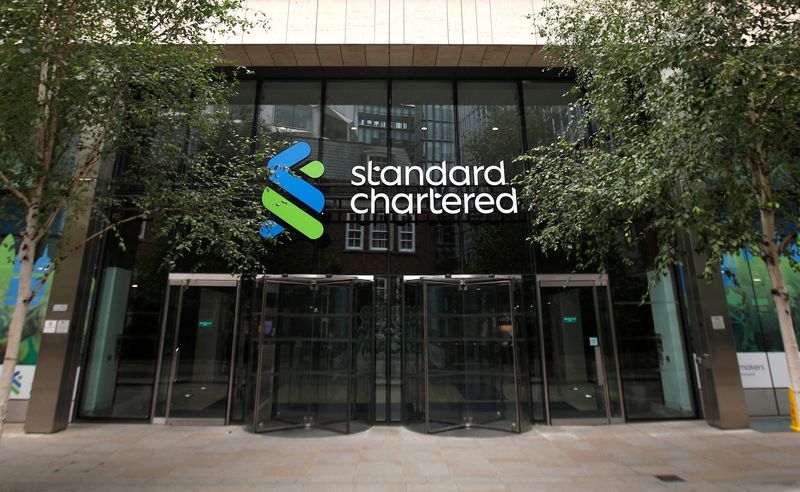Investments
BlackRock, Standard Chartered to join talks at new debt roundtable on Friday

 © Reuters. FILE PHOTO: The Standard Chartered bank logo is seen at their headquarters in London, Britain, July 26, 2022. REUTERS/Peter Nicholls/File Photo
© Reuters. FILE PHOTO: The Standard Chartered bank logo is seen at their headquarters in London, Britain, July 26, 2022. REUTERS/Peter Nicholls/File Photo
By Andrea Shalal and Jorgelina do Rosario
WASHINGTON/LONDON (Reuters) -U.S.-based investment firm BlackRock (NYSE:) said on Friday it would join a new sovereign debt roundtable set up to accelerate progress on stalled relief efforts for distressed countries with Britain’s Standard Chartered (OTC:) also joining according to sources.
The Global Sovereign Debt Roundtable, chaired by the International Monetary Fund, the World Bank and India – this year’s leader of the Group of 20 major economies – will hold its first virtual meeting on Friday, a gathering aimed at setting the agenda for an in-person meeting on Feb. 25 on the sidelines of a G20 finance leaders meeting in Bengaluru, India.
“We welcome the Global Sovereign Debt Roundtable and look forward to engaging constructively in the dialogue alongside other key stakeholders,” a spokesperson for BlackRock told Reuters.
Three people with knowledge of the matter said Standard Chartered would also join. A spokesperson for Standard Chartered declined to comment.
Unlike the Common Framework platform for bilateral debt restructuring, the roundtable talks include public and private creditors as well as borrowing countries. Such setup aims at finding common ground on standards, principles and definitions for how to restructure debts of distressed countries, officials have said.
Participants include officials from creditor countries China, India, Saudi Arabia, the United States and other wealthy Group of Seven democracies, as well as six borrowing countries – Ethiopia, Zambia, Ghana, Sri Lanka, Suriname and Ecuador.
BURDEN SHARING
World Bank President David Malpass, who helped organize the roundtable, said he hoped bringing the private sector into the process earlier – and facilitating its dialogue with China and other big creditors – would help speed up debt relief.
“To actually have debt relief that’s meaningful, there has to be a burden sharing among the various creditors,” Malpass told Reuters in an interview on Thursday.
Including specific financial institutions in the roundtable and having them join China, India and other bilateral creditors that are not part of the Paris Club marked a big step forward, he said.
Private sector creditors now hold a much bigger share of the debt owed by developing and emerging market economies than official sovereign creditors, but have been largely absent from the Common Framework process.
The World Bank’s International Debt Report showed that the external debt of the poorest countries nearly tripled to $1 trillion in 2021 from a decade earlier, and 60% of those countries were in or at risk of debt distress. Low and middle-income countries owed 61% of their debt to private creditors.
China – now the largest official creditor – has been holding back to see how other bilateral and private creditors participate in debt reductions, or haircuts. At the end of 2021, China was the largest bilateral lender to the poorest countries, accounting for 49% of their bilateral debt stock, up from 18% in 2010, according to World Bank data.
“Private creditors are major players in many debt restructurings and need to share the responsibility for achieving a successful restructuring,” Malpass added.
Subscribe to our weekly newsletter below and never miss the latest NEWS or an exclusive offer.


